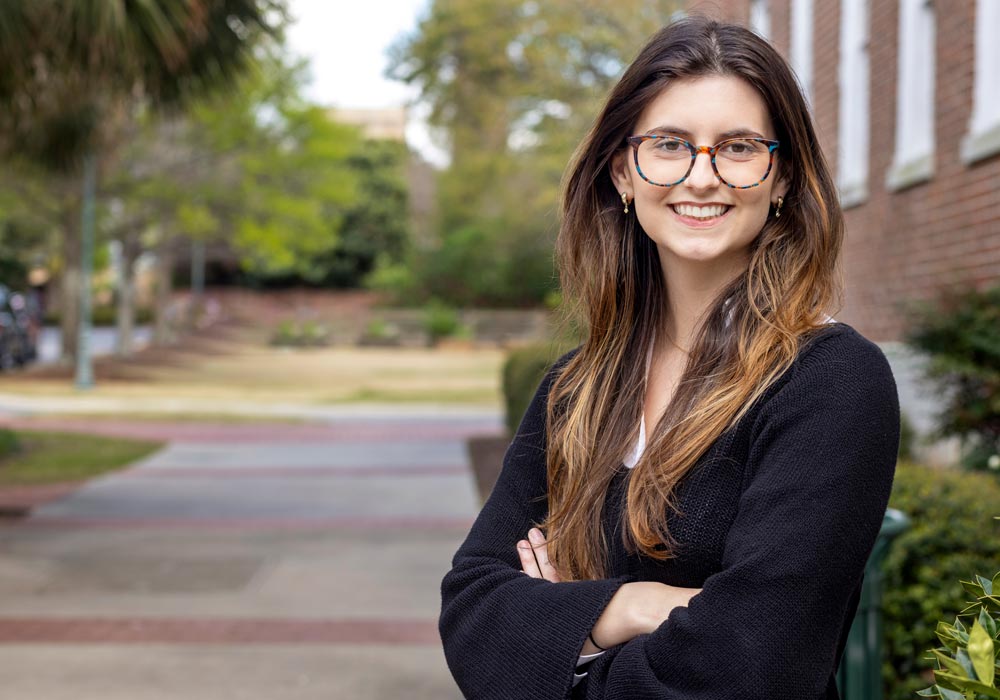Reese Lycan embodies the spirit of the Truman Scholarship. With an eye on becoming a physician, the South Carolina Honors College junior from Lexington, Kentucky, also wants to advocate for better health care access, particularly for low-income residents of rural Appalachia.
Lycan, who is majoring in biochemistry and molecular biology in the College of Arts and Sciences, is not just looking at medical schools, but also at public health programs. First, she plans to work for the Centers for Disease Control during the 2025 Truman Summer Institute in Washington, D.C.
“Specifically, I would like to work at the National Center for State, Tribal, Local, and Territorial Public Health Infrastructure and Workforce to gain knowledge of health infrastructure before beginning medical school,” Lycan says, adding that she would like to be a part of public policy work to address issues such as the lack of physicians and birthing centers in rural communities.
The scholarship, named for U.S. President Harry S. Truman, is highly competitive and awarded to juniors who plan careers in public service. Each Truman Scholar receives funding for graduate studies, leadership training, career counseling, and special internship and fellowship opportunities within the federal government.
Lycan, one of 60 recipients in 2024, is the 11th Truman Scholar at USC and the first since 2019.
“We are immensely proud to celebrate Reese as she joins a select and distinguished list of Truman Scholars from the University of South Carolina,” USC President Michael Amiridis says. “Through her activities as a Carolina student and beyond, she has demonstrated excellence in academics, leadership and commitment to service as an advocate for community health. As she pursues advanced education in medicine and public health with support from the Truman Scholarship, we look forward to following her future achievements in these fields.”
“I think we need more practicing doctors having a part in that conversation about reforming insurance and what health care looks like.”
Lycan’s desire to be an advocate led her to join Student Government’s National Lobbying Agency, where she served as director and created the 2022 Student Survey that would guide the team’s focus areas. The report of student-proposed policy solutions covered such issues as hazing, sexual assault and lack of resources for first-generation and immigrant students; it was presented to congressional lawmakers in February 2023.
Lycan also has worked as a peer tutor and in research labs, most recently with Olja Simoska, a chemistry and biochemistry professor, studying antibiotic resistance.
“While a career as a physician is really important to me overall, I want to work to improve the living conditions of all of America, hopefully, but especially those in rural Appalachia,” she says. “While a large chunk of my career will be practicing as a doctor, I also want to go into policy advisory and help improve our health care system.
“I think we need more practicing doctors having a part in that conversation about reforming insurance and what health care looks like.”
As Lycan prepares for her senior semester, she says, some of her best experiences at Carolina so far have been the lifelong friendships she has made in her sorority, Delta Zeta, and the work she did with Student Government.
“I've been able to work and engage with some just phenomenal students who have the best interest of all students at heart,” she says.
Some key initiatives she is proud to have helped former Student Government President Emmie Thompson with are ride-sharing discounts for students trying to get home safely and phone charging stations at the football stadium.
“I've just been really impressed with what a ragtag group of students has been able to do through that organization,” she says.
How they do it
Students applying for national fellowships and scholarships work closely with top research faculty members. Students interested in applying for national fellowships should contact National Fellowships and Scholar Programs.
